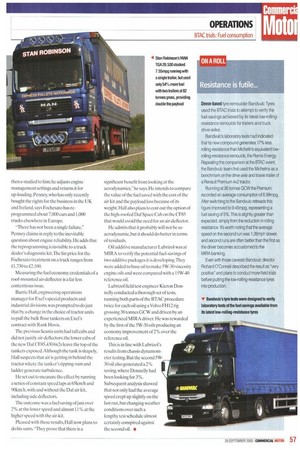I " I
Page 59

If you've noticed an error in this article please click here to report it so we can fix it.
Resistance is futile...
Devon-based tyre rernoulder Bandvulc Tyres used the BTAC trials to attempt to verify the fuel savings achieved by its latest low-rollingresistance remoulds for trailers and truck drive-axles.
Bandvulc's laboratory tests had indicated that its new compound generates 17% less rolling-resistance than Michelin's equivalent lowrolling-resistance remoulds, the Remix Energy. Repeating the comparison at the BTAC event, the Bandvulc team first used the Michelins as a benchmark on the drive axle and triaxle trailer of a Renault Premium 4x2 tractor.
Running at 26 tonnes GCW the Premium recorded an average consumption of 8.99mpg. After switching to the Bandvulc retreads this figure improved to 9.45mpg, representing a fuel saving of 5%. This is slightly greater than expected, simply from the reduction in rolling resistance. Its worth noting that the average speed on the second run was 1.26mph slower, and second runs are often better than the first as the driver becomes accustomed to the MIRA banking.
Even with those caveats Bandvulc director Richard O'Connell described the result as "very posftive" and plans to conduct more field trials before putting the low-rolling-resistance tyres into production.






























































































































































































